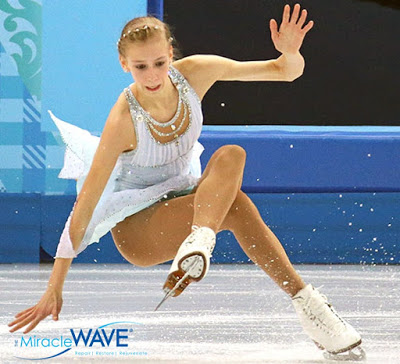 The sport of gracefully gliding, dancing and leaping… across a glass-like surface… wearing nothing on your feet but single blades strapped to each leather boot—aka figure skating, is nothing shy of beautiful.
The sport of gracefully gliding, dancing and leaping… across a glass-like surface… wearing nothing on your feet but single blades strapped to each leather boot—aka figure skating, is nothing shy of beautiful.
It’s also an activity that, just like any sport, is accompanied by the risk of injuries.
It’s true—accidents happen, especially on the ice. In addition to traumatic injuries, however, the American Orthopaedic Society for Sports Medicine reports that the most common figure skating injuries are actually by overuse.
Examples of the most common figure skating injuries include:
Figure Skating Injuries as a Result of Overuse
1. Tendinitis of the Achilles or patella
2. Stress reactions (shin splints or medial tibial stress syndrome) & stress fractures
in the foot or spine
3. Strains to the hip muscle(s)
4. Bursitis in the ankle(s)
Figure Skating Injuries as a Result of Trauma
1. Ankle sprains & fractures
2. Knee injuries (meniscal tears or damage to the ACL)
3. Hip injuries (labral tears)
4. Dislocation of the shoulder or knee cap
Common treatments for figure skating injuries vary, depending on the type of injury and its severity. Generally, the method of rest, ice, compression and elevation (RICE) is recommended for injuries sustained from overuse.
In cases of chronic muscle injuries or fractures, however, typical treatments can range from steroid injections, PRP (platelet-rich plasma) therapy, bone stimulators and even acoustic wave therapy.
In recent years, acoustic wave therapy (or AWT) such as The Miracle Wave® has been proven effective for thousands of athletes and patients with similar musculoskeletal conditions. Today AWT is used to treat a multitude of acute and/or overuse sports injuries in order to shorten the downtime required for athletes to recover.
Technology like The Miracle Wave® is additionally ideal for athletes because it’s non-invasive, and provides a practically painless alternative to surgery.
Many physicians who utilize The Miracle Wave® therapy on their patients have reported post-treatment results such as:
– relaxation of muscle and connective tissue
– improved microcirculation
– noticeably elevated stimulation across the injured area
– acceleration of metabolic activity
– heightened neurovascular performance
– increased serotonin hormone release
– significant stress reduction as a result of lowered cortisol levels
– overall revitalization, following a patient’s completed course of treatment
Further, athletes can use acoustic wave therapy in conjunction with training as well as competition, which can also minimize periods of inactivity for recovery. Whether you’re a figure skating athlete with an injury or are currently experiencing a painful musculoskeletal condition that requires treatment, The Miracle Wave® could be the solution for you.
To find out more about this new technology and how it can benefit you, visit our web site atTheMiracleWave.com TODAY.
References:
http://www.usfigureskating.org/Content/2009%20Common%20Hip%20Disorders%20in%20Figure%20Skaters-Robert%20J.%20Dimeff,%20MD.pdf
https://www.storzmedical.com/us/news/entry/storz-medical-at-the-sochi-olympics.html
http://www.dailyecho.co.uk/news/9731986.Medics_help_keep_Olympic_dream_alive/
http://www.cbc.ca/doczone/features/accidents-injuries
http://www.stopsportsinjuries.org/figure-skating-injury-prevention.aspx#common
